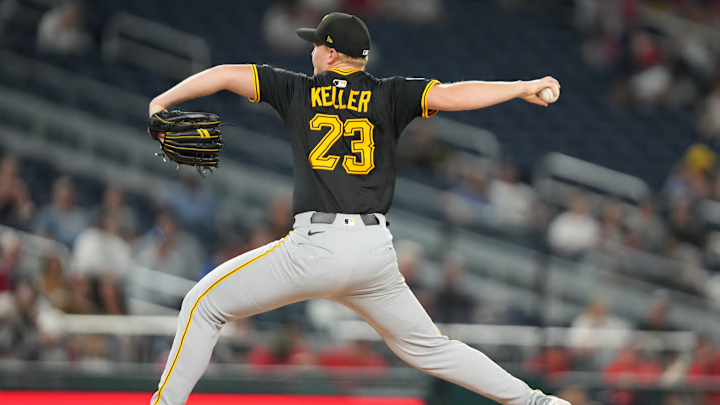One of the Pittsburgh Pirates' biggest priorities this winter will be finding a new home for Mitch Keller. The club squandered a golden opportunity to capitalize on a seller's market this summer, more than likely insisting that prospective suitors take on his entire salary while simultaneously demanding high-end prospects in return.
Now, the marketplace will be more crowded. Not only will the Pirates need to compete with other teams dangling their wares on the trade block after an ultimately inactive deadline on the starting pitching front, but they'll also have to deal with the free-agent alternatives. Since they'll still be looking for salary relief, any team considering acquiring Keller is basically signing a free agent to a three-year, $55.7 million deal, and giving up a youngster for the privilege of doing it.
That could sound like a hard sell, and that's certainly possible; however, it really all depends on where Keller would slot into this free-agent class. Does his remaining salary look like a bargain? Or is he getting essentially a market rate? If it's the latter, well, good luck. But if it's the former, the Pirates could find a deal, as long as the caliber of prospect they expect in return is reasonable.
Stacking Pirates starter Mitch Keller up against the free-agent competition
Taking a deeper look at this requires defining what Keller actually is. He's no ace, that's for sure, so teams shopping at the top of the market aren't going to look his way. Instead, he falls somewhere between a No.2 and a mid-rotation arm. So that's what he'll be compared to in the marketplace.
There is another caveat. Keller's signed for three more seasons, so while a team could find a comparable arm on a one-year deal with a veteran on the back nine of his career, we're going to assume any team considering trading for Keller is doing so because they want him in the rotation for the foreseeable future. That means clubs that fit that bill would also be shopping in the multi-year commitment aisle rather than the one-year bargain bin.
What we wind up with is a collection of four starters who are either outright free agents or have options that they are highly likely to decline. Other pitchers with an opt-out or player option that is more of a 50-50 proposition were excluded. All four are either 30 or 31, so roughly the same age as Keller.
Lastly, to truly break this down, we need contract predictions to see if Keller really has surplus value. For that, we took a look at Spotrac's contract projections for each guy on the list. With that, we're looking at four key factors. Those are the total contract value (projected), average annual value (important for luxury tax purposes, 2025 ERA, and an average of the last three seasons' ERA to provide additional context.
Pitcher | Contract | AAV | 2025 ERA | 3 Year ERA Avg |
|---|---|---|---|---|
Zac Gallen | 4 yrs / $74.8MM | $18.7 million | 4.83 | 3.98 |
Zack Littell | 3 yrs / $38.7MM | $12.9 million | 3.81 | 3.85 |
Michael King | 4 yrs / $91.9MM | $23 million | 3.44 | 3.05 |
Lucas Giolito | 3 yrs / $61.3MM | $20.4 million | 3.41 | 4.40 |
Mitch Keller | 3 yrs / $55.7MM | $15.4 million* | 4.19 | 4.22 |
*Note: the AAV of Keller's contract is based on the original deal he signed. That's what counts for the luxury tax, but the value of the remaining years is $18.6 million per year.
At first glance, it seems that Keller compares pretty favorably. Other than Littlell, he'd be the cheapest option, though his ERA numbers are the second-worst of the group. The back stories of these players add some important context.
King is the best of the bunch, but he only has two seasons as a regular starting pitcher, and his 2025 season was rather injury-plagued. Littell has also bounced back and forth from the rotation throughout his career. Every pitcher named is a right-hander.
Giolito's 3.41 ERA came after two campaigns where his ERA was pushing five, and he ended the year with an elbow injury. Gallen would've had an argument not to be included in this group prior to the season, which was a career-worst.
A case can be made that Keller is both the most consistent and durable of the options grouped above. While he hasn't had the highs some of the others have, he's also avoided the lows. He's also been a regular presence in Pittsburgh's rotation and hasn't suffered any major injuries in recent years.
He's a worthy alternative, though to say he might be a better value seems to be a stretch. Ultimately, a deal being made will come down to two things. First, a team needs to like what he brings to the table above the others. Secondly, the Pirates need to set a reasonable price. It's that second piece that could ultimately prevent a deal from getting done.
